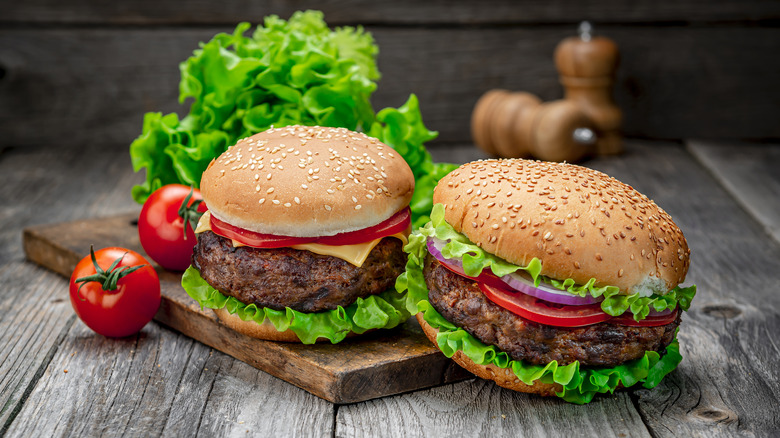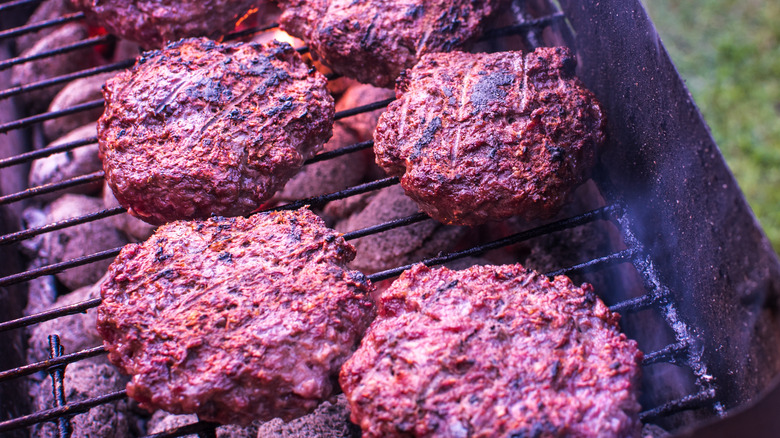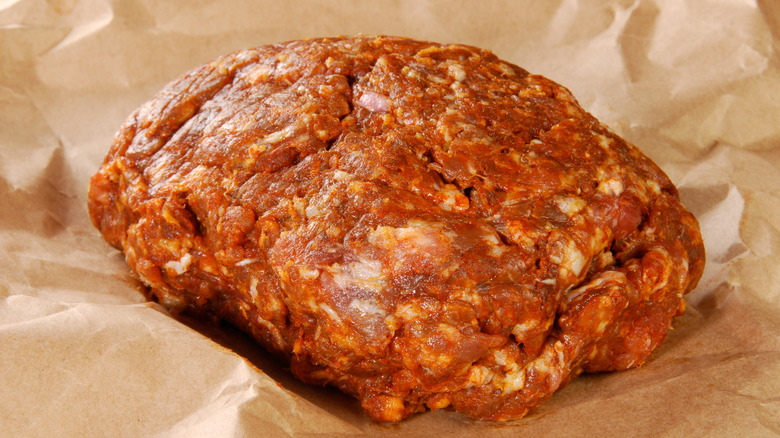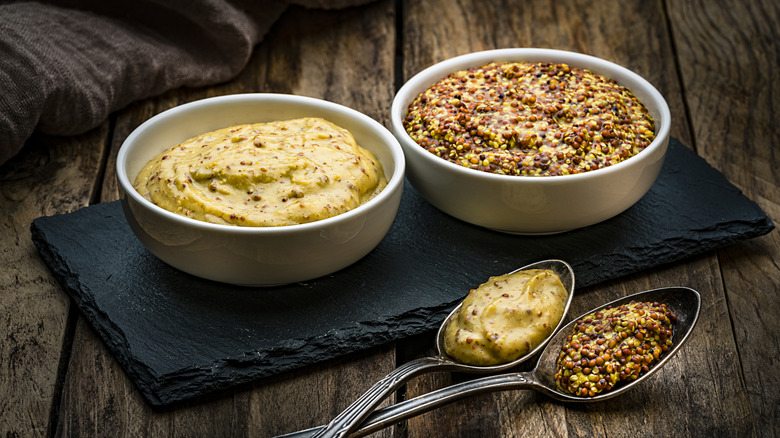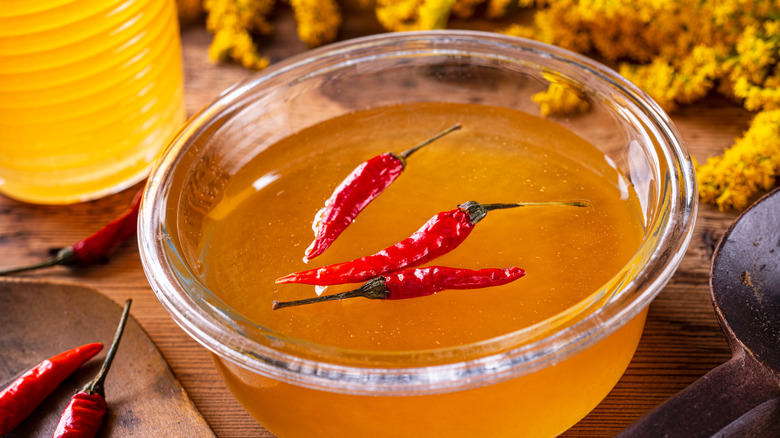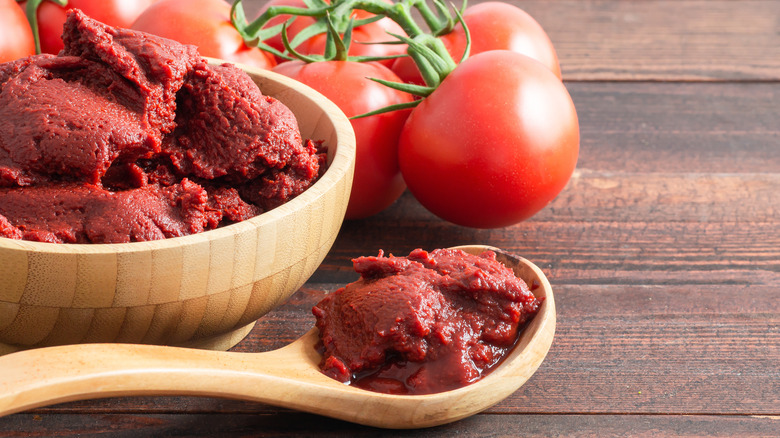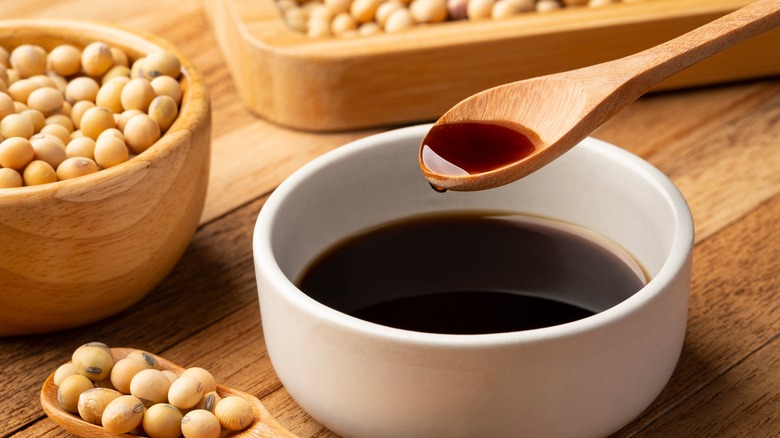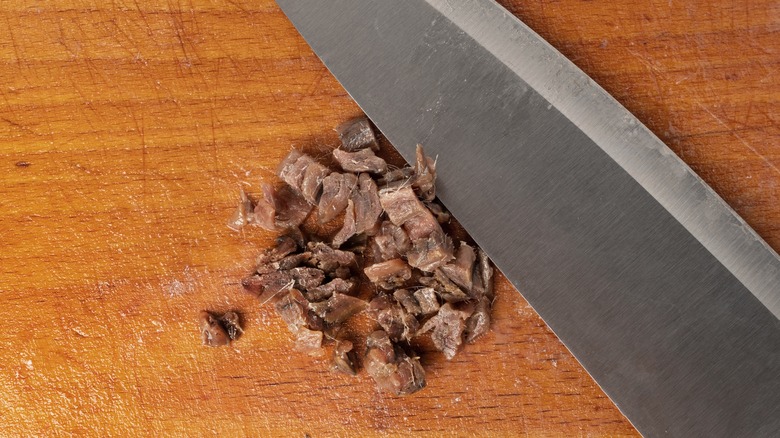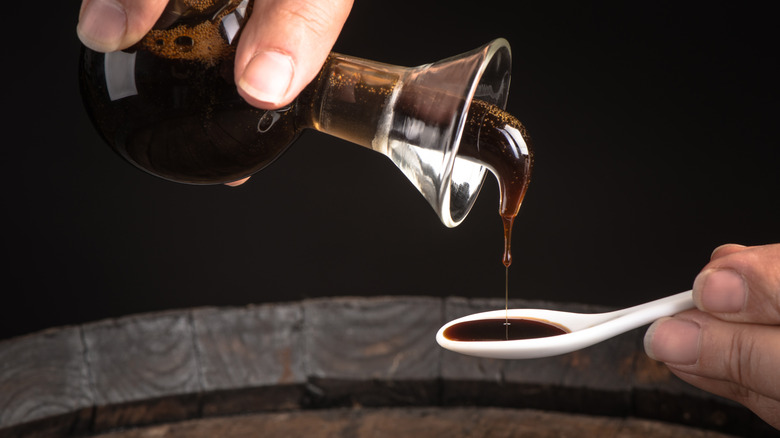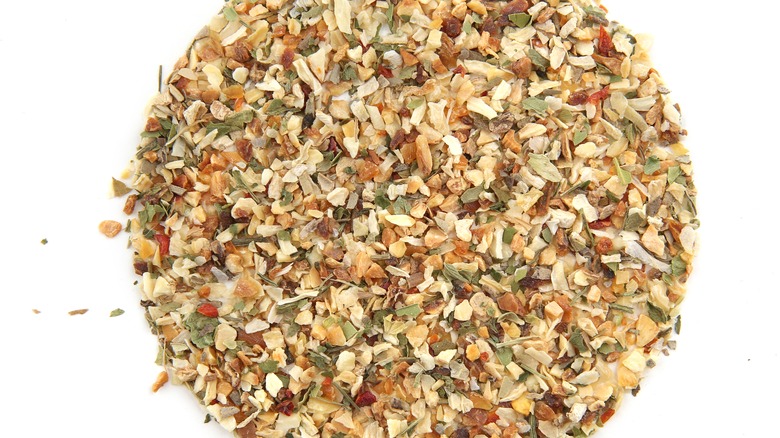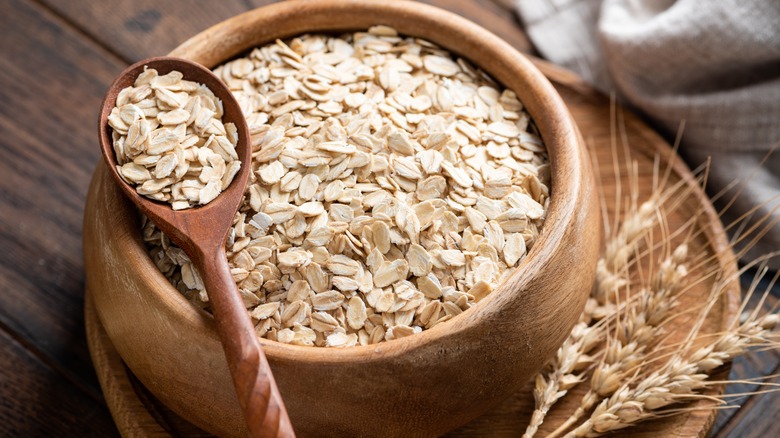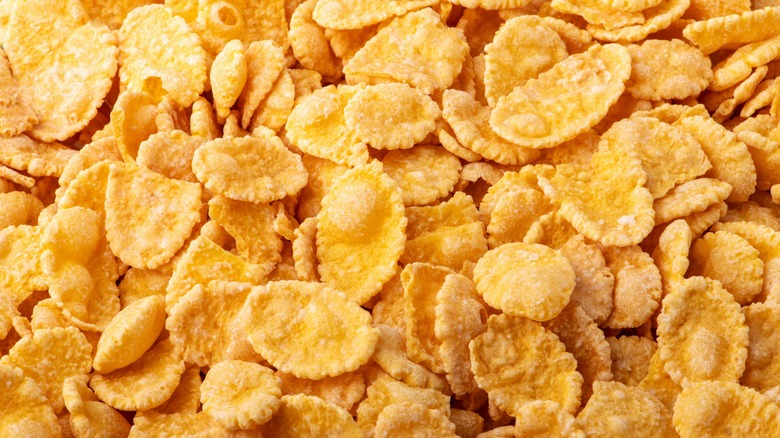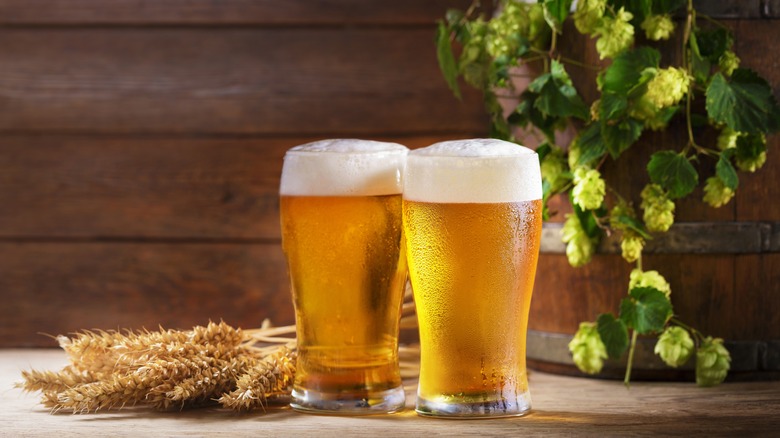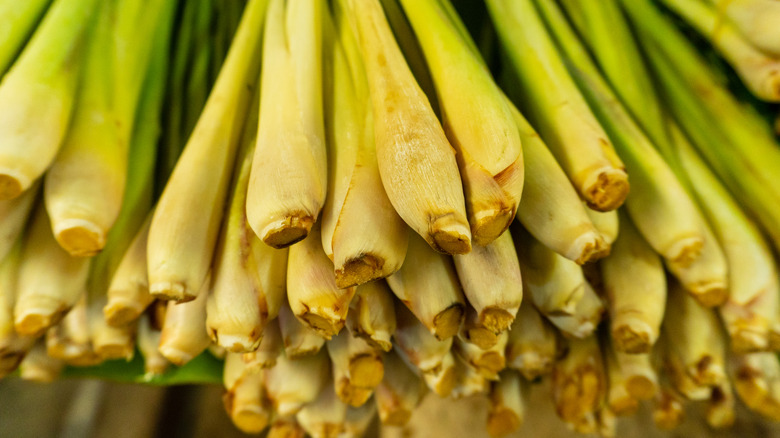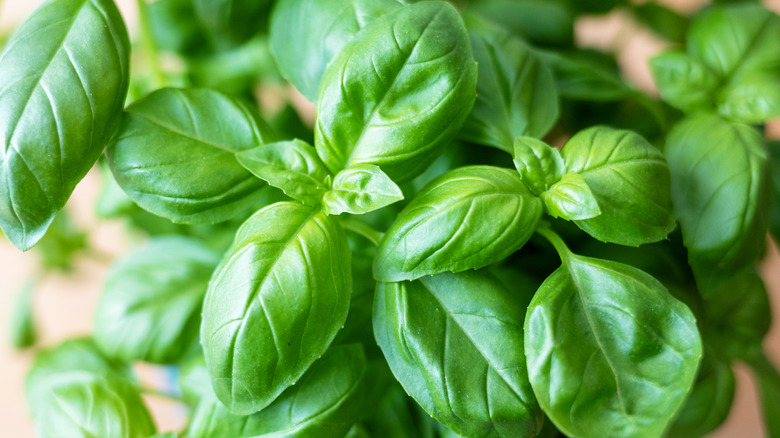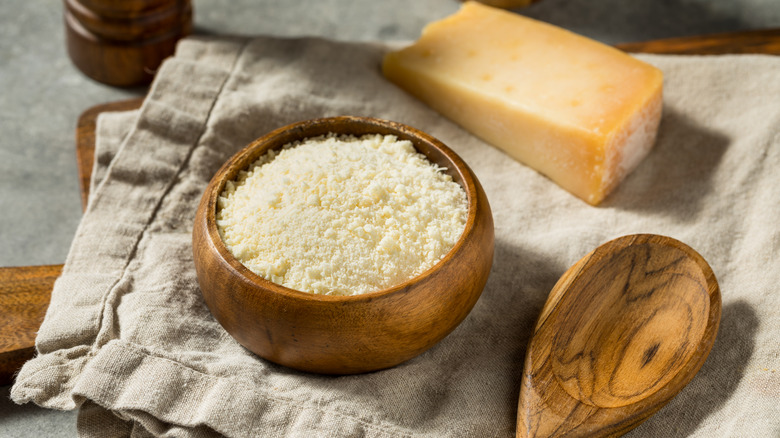15 Secret Ingredients You Should Be Using In Your Burger Patties
Many culinary purists will tell you that a minimalist approach is the best way to create the perfect burger. While it's true that you can rely solely on high quality meat, salt, and pepper, this holy trifecta overlooks the potential of what a burger can be.
Sticking with the basics is great on paper, but what if you want a completely different taste profile or you're working with lower-quality beef? Simple burgers also require enough fat to bind the patty together, so how do you tweak your recipe if you're opting for leaner meat?
During my time in the hospitality industry, I've worked at a range of different venues, including a few award-winning burger joints. I've always loved making homemade burgers, but my time at these outstanding establishments taught me more than a lifetime of experimenting in my kitchen ever could. That said, I've continued to tweak my own recipes based on the tricks I've learned in the restaurant business. The list below is the result of this experience and includes my favorite secret ingredients that you should try out next time you're making homemade burger patties.
Game meat
One of the more overlooked burger patty ingredients is game meat, such as elk, venison, even bison. These meats are deliciously rich and highly nutritious, but they're commonly passed over, as cooking with game meat can be a tricky affair.
The main issue is that game meat tends to be extremely lean due to the highly active lifestyles these wild animals lead compared to their farmed counterparts. One workaround is to use a binding ingredient, like breadcrumbs, but this isn't ideal if you want to keep your recipe as pure as possible. Instead, you can use a combination of game meat and beef. You'll want to use ground beef with a fat percentage of around 15-20%, but you don't need to add too much to your patty mixture. A ratio of around 4:1 game meat to beef should be enough to let your game meat's flavor take center stage while still introducing enough fat to keep the burger in one piece on the grill.
Chorizo
Adding ground pork to a beef patty mixture is a pretty common way to add more fat while giving the burger a sweet and richer taste profile. However, if you want to increase the depth of flavor and add a spicy kick to your patties, chorizo is an excellent choice.
Chorizo is essentially just Spanish-style seasoned pork, but it packs a huge punch in recipes that include it. However, you should be aware that it comes in two forms — trust me, I've made this mistake before. Cured chorizo is the stuff you'll find on charcuterie plates and in sandwiches and doesn't need cooking, although this isn't suitable for burgers. Instead, you'll want to pick up cooking chorizo, which comes raw. A 4:1 ratio of beef to cooking chorizo is a good place to start, as the chorizo will complement the beef without overpowering it. If you want the spicy-sweet chorizo to be the dominant flavor, you can go as far as a 2:1 blend of beef to pork.
Dijon mustard
Mustard is a superb way to add some earthy spice to a recipe, and I find that it's a particularly effective ingredient for enhancing burger patties. However, mustard comes in many different varieties, each with its own unique properties.
For burgers, I find Dijon mustard hits the sweet spot. Its heat isn't overbearing, and its tangy acidity complements the rich beef extremely well. Dijon is also smooth and creamy, so it helps to bind the patties together and retain moisture, resulting in an extra juicy burger. If you want your patties to have a more interesting texture, you can try wholegrain mustard instead, as its flavor profile is nearly identical. There's also a third option. Celebrity chef Ina Garten recommends using dry mustard as a burger seasoning as it introduces a sharp quality to the patty. Dry mustard is essentially ground-up mustard seeds, so it's an easy ingredient to add to your burger seasoning mix.
Hot honey
While hot honey isn't technically a new invention, it didn't really show up in modern American cuisine until 2010, when Mike Kurtz launched Mike's Hot Honey. In the years since, this style of chili-infused honey has become a favorite condiment of mine, and I couldn't help trying it out in a batch of burgers.
The results blew me away, and not just from a flavor perspective. To start, the subtle sweetness of the honey provides a great contrast to the more savory ingredients, especially toppings like bacon. Hot honey also typically includes vinegar, which helps to cut through the richer aspects of the fatty burger meat and adds a slight tang to the patty, along with the spice of the chili. Honey is also a humectant, meaning it has the natural ability to attract and retain water. From a cooking standpoint, this means the hot honey helps to keep your patties moist while they cook, ultimately resulting in a much juicier burger.
Tomato paste
Adding a little tomato paste to your patties is a great way to enrich the flavor, especially if you want to give them a meatball-like quality. The concentrated nature of tomato paste offers a welcome umami boost, and it has a gentle sweetness that nicely balances out the savoriness of the beef.
If you're using leaner meat for your patties, tomato paste also helps bind the mixture together and prevents the burgers from drying out as they cook. If you don't have tomato paste to hand, there are some substitutes you can try. Tomato sauce will do the trick, but it's got a more watery consistency that prevents you from using too much. A more effective approach is making your own tomato paste. Start with a tin of chopped tomatoes with as few added ingredients as possible. Blend these into a purée and reduce them down on the stove to about a third of their original volume, and you'll be left with a suitable alternative to a concentrated paste.
Soy sauce
Most patty recipes recommend adding Worcestershire sauce to the mixture. The fermented condiment includes ingredients ranging from pungent anchovies to naturally sweet tamarind, which add intense depth to burgers.
The smorgasbord of ingredients in Worcestershire sauce provides a huge umami hit and an extra salty kick, but this isn't always the best option if you want to showcase as much of the natural beef flavor as possible. Soy sauce, on the other hand, contributes these two crucial qualities in a much simpler way. I suggest using dark soy sauce, as it's rich yet balanced and ever so slightly sweet. The main thing to bear in mind if you're adding soy sauce to your patties is that you'll want to adjust your seasonings by cutting back on the salt. I typically equate 1 tablespoon of soy sauce to 1 teaspoon of sea salt. However, it's best to use a combination of soy sauce and salt to avoid introducing too much moisture to your patties.
Anchovies
While these little fishies aren't everyone's cup of tea, anchovies are salty, umami-packed powerhouses. They're also extremely nutritious and will add some extra vitamins and minerals to your burgers, including healthy omega-3 fatty acids. Don't worry; I promise they're not going to make your burgers taste like seafood.
Start by picking up a jar of those anchovies that come in olive oil. You can go for tinned anchovies but they're a little bit messier to store if you're not using the whole lot at once. You only need one or two of these little guys, depending on the size of the anchovies and how big your burger batch is. Next, dice them up as finely as possible or give them a quick blitz in a food processor. Lastly, you want to combine them thoroughly into your burger mixture. Once again, be wary that they're going to contribute to the saltiness of your patties, so adjust your other seasonings accordingly.
Balsamic vinegar
A splash of vinegar is always a welcome addition to burger patties, and there are plenty of types out there that will get the job done. Firstly, the natural acidity of vinegar is a great way to help tenderize tough meat, especially if you let your patties rest overnight before cooking.
Vinegar's acidity also helps to cut through some of the fattiness of the meat, it keeps the burger moist, and it adds a subtle tanginess. If I'm making pork burgers, I tend to use apple cider vinegar, as the slightly sweet apple flavor is a natural companion to the meat. However, for most other burgers, including beef, I reach for the balsamic vinegar. I love the depth and complexity it provides, as well as a hint of sweetness that contrasts with the savory ingredients. Balsamic vinegar will also caramelize a little bit during cooking, improving both the taste and the texture of the finished patty.
Onion soup mix
This is a slightly strange ingredient that I had to try after a friend — somewhat unconvincingly — recommended I give it a try. As it turns out, dried onion soup mix is an excellent seasoning shortcut that'll save you time and money, especially if you don't have a fully stocked spice rack.
Onion soup mix is essentially an all-in-one pre-mix of common burger seasonings, with plenty of brands offering their own version of the product. Aside from dried onion flakes, it typically contains onion powder, salt, soy sauce, and other spices. As it turns out, using onion soup mix as a seasoning for non-soup recipes isn't a particularly new concept. It works just as well if you're flavoring dishes like meatloaf, or sides, like creamy homemade dips. It's a versatile enough combo that you can mix up your own in a jar for ease of use or just stick to the packets from the grocery store.
Rolled oats
As I mentioned earlier, if you're using lean meat in your burger patties, you might need a binding ingredient to stop them from falling apart during cooking. Breadcrumbs are the most common pick, but it's good to know what substitutes will do the trick if you don't have any on hand.
Rolled oats are a great alternative for binding your burger mixture together. For starters, they're nutritionally rich in fiber, protein, and various other vitamins and minerals. Plus, they're gluten-free as long as they've been processed without cross-contamination. Oats are also very effective at absorbing moisture, leading to a juicier patty after cooking. They're also softer than breadcrumbs, which are usually pretty crispy, so you'll end up with a smoother texture. I'd suggest using no more than ½ cup of oats per 1 pound of extra lean beef, but you can reduce this for fattier meats. If you want a finer texture for your burger patties, you can even blitz them into powder in a food processor, and they'll work just as well.
Breakfast cereal
Fortunately, if your pantry's running a little low on supplies, breadcrumbs and oats aren't your only options for binding burger patties. Breakfast cereal will also work just as well, although it should go without saying that only some types are suitable.
Although there are plenty of kinds of cereal that will do the job, you shouldn't use any flavored or sweetened varieties. It should go without saying that adding Lucky Charms to a burger mixture is a terrible idea. However, plain cereals like corn flakes, rice puffs, or shredded wheat will bind the mixture just as well as breadcrumbs could. You'll need to grind them up into a powder first, but how finely you grind them depends on what texture you're after. A food processor is great, but you can just as easily do the work by hand. Simply put the cereal in a ziploc bag and seal it tightly with as little air left inside as you can manage. You can crush the cereal by hand, but I find a rolling pin is the best tool for the task.
Beer
Beer cheese dip, steak and ale pie, beer battered fish — there are plenty of recipes that benefit from a splash or two of the world's favorite alcoholic beverage. Beer can also be a great addition to your burger patties when used sparingly, and if you choose the right style.
As delicious as hoppy beers are, they're generally not well-suited for cooking. Instead, we want to look to maltier brews if we hope to add some depth of flavor that pairs well with the rest of the ingredients. These will add a touch of malt sweetness to your burger, increase the moisture in your mixture, and can also help the burger caramelize while it cooks. Everyday lagers won't add much to your patties, so you'll want to look at the darker ales. Stouts, such as Guinness, are excellent for introducing rich and roasty flavors. Brown ales are another solid option, as they're slightly sweet with medium bitterness, are extra malty, and tend to have a slightly nutty profile that's a great match for meat.
Lemongrass
While lemongrass is a slightly unusual ingredient and doesn't work for every type of burger, it can be a superb addition for patties with an Asian or Mediterranean twist. I don't recommend using it with beef, but certainly for fragrant pork or lamb burgers.
Lemongrass boasts an incredibly fresh citrus flavor that simultaneously lifts, lightens, and enriches a burger's flavor profile. While you might struggle to find it in your everyday supermarket, you can usually get hold of a bundle at specialty Asian food shops. To prepare lemongrass, first peel away the outer leaves from the stalks and cut off the tips of the bulbs. Now, you can cut the stalk into thin slices like you would with scallions. How thinly you slice them depends on how much crunch you want them to have in your patties — you can dice them up or use a food processor to break them down into even smaller pieces. If it's your first time cooking with lemongrass, experiment with a small quantity first, as it can be a particularly strong-tasting ingredient.
Basil
There are plenty of herbs that make a welcome addition to burger patties. Oregano, thyme, and rosemary tend to work with most meats, like beef, pork, or lamb. However, fresh basil is one I find makes the biggest impact.
Basil has both sweet and savory notes, a delicate pepperiness, and it's herbaceously pungent in all the right ways. Its flavor profile complements the majority of burger styles and toppings, and adding it to your patties is as simple as roughly chopping up the leaves and stirring them into your mixture. It's also versatile enough to cross cuisines — in fact, one of my favorite burgers is a Thai-style recipe. I opt for ground pork as the base, and mix in Thai basil, lemongrass, ginger, some chili flakes, and use fish sauce for my umami liquid. Whatever recipe you choose, the important thing is to make sure you pick out a high-quality basil. Or, if you have a green thumb, you can try growing your own at home for a limitless supply.
Parmesan cheese
There's arguably no better companion for a burger than cheese. However, instead of only adding it on top of the patty, why not infuse your patty with cheesy goodness, too? Now, I have experimented with making cheese-stuffed patties before, and while it can be done, I'd argue that it's a bit fiddly to be worth the effort.
It's much easier to combine the cheese with your patty mix, and I find that Parmesan is the best cheese for this purpose. Finely grated Parmesan doesn't mess with the structure of the patties too much — if anything, it helps hold the patties together as the cheese melts. That said, I wouldn't rely on cheese alone as a binding ingredient. If you're using lean meat, you'll still want to add some fattier meat, breadcrumbs, or one of the alternatives I mentioned above. From a flavor perspective, Parmesan has a great umami profile, with some nice salty and nutty characteristics that will still shine through after cooking.

